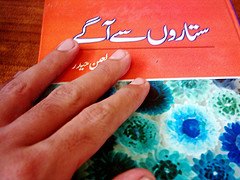 The term brain drain was coined by the spokesmen of the Royal Society of London to describe the outflow of scientists and technologists to the United States and Canada in the early 1950s. Since then the term has become synonymous with human capital or the migration of highly educated individuals from the developing, mostly third world countries, to the developed ones.
The term brain drain was coined by the spokesmen of the Royal Society of London to describe the outflow of scientists and technologists to the United States and Canada in the early 1950s. Since then the term has become synonymous with human capital or the migration of highly educated individuals from the developing, mostly third world countries, to the developed ones.
 Over the past few decades, more since Pakistan has been lurched full throttle into economic and political chaos, the phenomenon has become the bane of the society. The number of repining Pakistanis who wish to settle abroad is rising every year and the ones who are actually capable of breaking loose are coincidentally the educated ones, contributing alarmingly to the growing crisis of the Pakistani brain drain. To leave the country and settle abroad has become the zeitgeist of current day Pakistan.
Over the past few decades, more since Pakistan has been lurched full throttle into economic and political chaos, the phenomenon has become the bane of the society. The number of repining Pakistanis who wish to settle abroad is rising every year and the ones who are actually capable of breaking loose are coincidentally the educated ones, contributing alarmingly to the growing crisis of the Pakistani brain drain. To leave the country and settle abroad has become the zeitgeist of current day Pakistan.
 Unfortunately either the government does not realize the severity of the problem or prefers to brush it under the proverbial rug like so many other issues. The migration of the Pakistani professionals to foreign countries, namely, US, Canada, Australia and New Zealand has increased considerably with young educated and skilled Pakistani such as doctors, IT Experts, scientists and other professional either already gone or planning to leave. The fact that workers from all skill levels are losing or have completely lost faith in the economic future of the country was revealed by the Gallup survey that indicated that even the semi-skilled and unskilled workers want to migrate outside in search of better prospects. 62 percent of the adults who were surveyed expressed the desire to migrate abroad while 38 percent said that they would prefer to settle outside permanently.
Unfortunately either the government does not realize the severity of the problem or prefers to brush it under the proverbial rug like so many other issues. The migration of the Pakistani professionals to foreign countries, namely, US, Canada, Australia and New Zealand has increased considerably with young educated and skilled Pakistani such as doctors, IT Experts, scientists and other professional either already gone or planning to leave. The fact that workers from all skill levels are losing or have completely lost faith in the economic future of the country was revealed by the Gallup survey that indicated that even the semi-skilled and unskilled workers want to migrate outside in search of better prospects. 62 percent of the adults who were surveyed expressed the desire to migrate abroad while 38 percent said that they would prefer to settle outside permanently.
 It is often thought that the transmittance of funds by the ones who leave the country as a result of brain drain is a good enough substitute for these individuals actually staying in the country and working. But that idea is valid only to a minimal extent as there can be no substitute for services these professionals could be rendering the country by staying within the borders and adding to a far rapid economic, scientific and technological development of the country. Again, that can only happen if the proper infrastructure is provided to them whereby the country could earn manifold the money it receives from transmittance from the migrated workers.
It is often thought that the transmittance of funds by the ones who leave the country as a result of brain drain is a good enough substitute for these individuals actually staying in the country and working. But that idea is valid only to a minimal extent as there can be no substitute for services these professionals could be rendering the country by staying within the borders and adding to a far rapid economic, scientific and technological development of the country. Again, that can only happen if the proper infrastructure is provided to them whereby the country could earn manifold the money it receives from transmittance from the migrated workers.
 According to Dr. Fitzhugh Mullan of George Washington University every doctor who leaves a poor nation leaves a hole that cannot be filled. He says,
According to Dr. Fitzhugh Mullan of George Washington University every doctor who leaves a poor nation leaves a hole that cannot be filled. He says,
“That creates enormous problems for the source country and the educational and health leaders in the country who are attempting to provide healers”.
Research shows that at 20 countries export more than 10 percent of their physician work force to richer nations with nearly no reciprocation as the US exports less than one-tenth of 1 percent of its doctors. Economic factor is primarily responsible for this mass migration of the scientific community from poorer, host countries like Pakistan. In Pakistan the value placed for a scientist with an advanced level degree is Grade 17 which comes with a salary that is totally insufficient to meet the basic requirements of a family. So it is no surprise that the advanced countries are exploiting the situation by offering these individuals far more handsome incentives.
 Asif J. Mir writes in ‘Pakistani Think Tank’,
Asif J. Mir writes in ‘Pakistani Think Tank’,
“We cannot achieve long-term economic growth by exporting our human resource. In the new world order, people with knowledge drive economic growth. We talk a lot of poverty alleviation in Pakistan. But who is going to alleviate the poverty-the uncreative bureaucracy that created poverty? Hypothetically, the most talented should lead the people, create wealth and eradicate poverty and corruption”.
Phillip Bonosky, contributing editor of Political Affairs, writes in his book Afghanistan-Washington’s Secret War.
“Pakistan seems to have nothing but problems. Endemic poverty which was Great Britain’s imperial gift to the colonial world-a poverty on which the sun never sets-skilled (badly needed in Pakistan itself) abroad in search for jobs. Hardly any country has suffered more from the brain drain than has Pakistan. Nearly 3,000 (annually) graduates of Pakistan’s medical colleges are jobless; most go abroad. The educated see their future not in their home country but in any country but their own”.
 According to a report in the The Observer, London,
According to a report in the The Observer, London,
“Pakistan is facing a massive brain drain as record numbers of people desperate to leave their politically unstable, economically chaotic country swamp foreign embassies with visa applications-The biggest number of applications for British visas are from Pakistan. Doctors, lawyers and IT professional and leading the exodus, but laborers and farmhands are joining the queues of malnourished people who gather daily outside the US embassy in Islamabad”.
 The greatest effect of brain drain on any country is what is seen in Pakistan today; rampant corruption, poor administrations, lack of motivation and a fast diminishing nationalism. Unless there is nationalism there can be no collective progress and poverty and crime will continue to increase under the umbrella of plethoric apathy. Whatever the solution it needs to come fast and it needs to be come now otherwise – when the educated are away, the uneducated will play – as they are playing at the moment.
The greatest effect of brain drain on any country is what is seen in Pakistan today; rampant corruption, poor administrations, lack of motivation and a fast diminishing nationalism. Unless there is nationalism there can be no collective progress and poverty and crime will continue to increase under the umbrella of plethoric apathy. Whatever the solution it needs to come fast and it needs to be come now otherwise – when the educated are away, the uneducated will play – as they are playing at the moment.
Photo Credits: Flickr.com. Clicking on the photos will take you to their source pages.


















































Hello,
I guess the core problems are lawlessness, inequitable distribution of wealth and discrimination (in all its forms).
There is no respite from these issues in the forseeable future.
Successive military dictators have deprived the country of practically all institutions.
There seems to be no way out. Nationalism seems to be our only hope.
Zain I. Syed
Hello Fellow Professionals & Nationals
This is very well known to all the medical, paramedical, and other health staff that our governments, and the administration have failed through out in implementing health care as a whole. We are lacking work regulations, work hours’ limitations, drug regulations, medical legislation, career growth in each and every term; while the nation being ignorant about health awareness, suffers a great threat as MDR-TB and other drug (pre-dominantly antibiotics) resistance has reached our bed-rooms already; quacks are on the flourishing part of the society, while health education means only to pursue FCPS as a mean to prosper. Myths stinging us in the best manner they can, and the busters are keen to flee the country leaving only aroung 50,000 practicing doctors nation-wide in 2025.
We have launched a crusade and willing to proceed in the best possible manner to give the country a healthier society, and happier medics and paramedics.
We have launched a crusade for Enhanced health care in Pakistan and need to have as many doctors as possible with us.
I’d like to add you to my professional network to join a crusade for the vast aspects of enhancing health care in Pakistan. This would include the following:
Be one of Us;
Join our Campaign; Your Campaign.
“DOCTORS CRUSADE”
Details @
http://sites.google.com/site/doctorscrusade/home
Regards
Dr. Atif Ashraf
i think if we would be morally strong enough than we do not need to even think about brain drain
The greatest effect of brain drain on any country is what is seen in Pakistan today; rampant corruption, poor administrations, lack of motivation and a fast diminishing nationalism. Unless there is nationalism there can be no collective progress and poverty and crime will continue to increase under the umbrella of plethoric apathy. Whatever the solution it needs to come fast and it needs to be come now otherwise
I think in a year or two